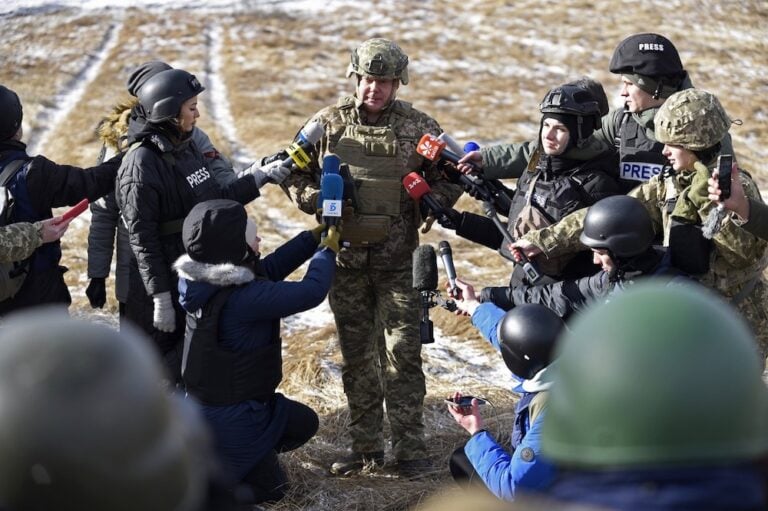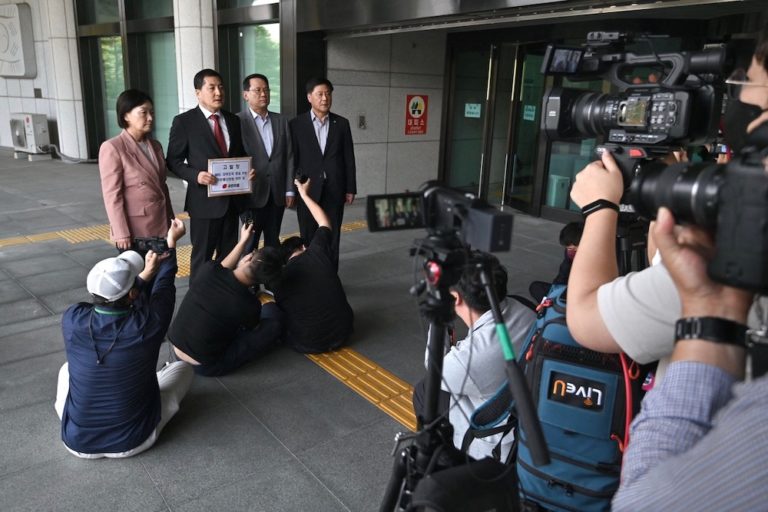(IPI/IFEX) – The following is a 16 May 2001 IPI letter to South Korean President Kim Dae-jung: His Excellency Kim Dae-jung President Office of the President Seoul South Korea Vienna, 16 May 2001 Your Excellency, The International Press Institute (IPI), the global network of editors and media executives, is deeply concerned over what appears to […]
(IPI/IFEX) – The following is a 16 May 2001 IPI letter to South Korean President Kim Dae-jung:
His Excellency Kim Dae-jung
President
Office of the President
Seoul
South Korea
Vienna, 16 May 2001
Your Excellency,
The International Press Institute (IPI), the global network of editors and media executives, is deeply concerned over what appears to be an ongoing attempt to muzzle the critical voice of the independent press in South Korea.
The past few months have seen increased pressure on the country’s independent newspapers by the government, pro-government media and self-proclaimed media reformists. Since your New Year’s press conference, on 11 January, when you emphasized the alleged need for media reform, “press reform” has become an important part of the government’s agenda. While the independent newspaper industry and opposition politicians reject the initiative, which they say is an overt attempt to silence critical voices, public broadcasting companies and other pro-government media, as well as certain civic groups, including the People’s Coalition for Media Reform, have supported Your Excellency’s call for reform. Some government ministers and members of the ruling party have even spoken of the need to “wage a war against the press.”
In addition, the National Tax Service (NTS) has been carrying out a large-scale tax probe of 23 Seoul-based media companies. This unprecedented tax investigation started on 8 February and was to last for 60 working-days. 17 newspapers, five TV broadcasters, and the Yonhap news agency are being investigated, although a majority of the tax investigators working on the audit have been assigned to the so called “Big Three,” the national dailies Chosun Ilbo, Joong-Ang Ilbo and Dong-A Ilbo.
The Korea Fair Trade Commission has joined the NTS in investigating the media, and announced that it will revive controversial newspaper regulations that were scrapped two years ago. This has raised fears among the newspaper industry and opposition politicians that the regulations will pave the way for more government intervention into independent media companies.
IPI is now informed that on 4 May the NTS announced the extension of its tax investigation for another 40 days, with a special focus on the “Big Three” dailies.
On behalf of IPI, I urge you to solve this issue in a manner befitting a democratic country. Should you feel there are grounds for complaint, I would suggest that you organise a round table meeting between representatives of the government and members of the concerned media, in particular from all three big national dailies. IPI, with members of its international community in attendance, could act as mediators of this meeting. I am sure you will agree that this approach would be more appropriate for an internationally-respected president who cares for democratic values and principles.
The international press freedom community hopes to soon witness some positive signs that the government intends to alter its present methods and work toward ending this controversy. Should this issue not be resolved in a democratic fashion, I would be forced to propose at the next meeting of the IPI Executive Board that South Korea be placed on the “IPI Watch List.” This mechanism was created to focus worldwide media attention on countries that are free or partly free but are in danger of moving towards suppressing or restricting press freedom. In practice, the status of countries placed on the “IPI Watch List” is evaluated twice a year by the IPI Board. After the evaluation, countries are either removed from the list or face renewed efforts by IPI to bring about change.
IPI sincerely hopes that Your Excellency will do everything possible to keep the government from going ahead with its planned press regulations and the extended tax audit, and that you initiate a process of dialogue, rather than confrontation, with the parties involved.
We thank you for your attention.
Yours sincerely,
Johann P. Fritz
Director
Recommended Action
Send appeals to the president:
– expressing the hope that he will do everything possible to keep the government from going ahead with its planned press regulations and the extended tax audit
– urging him to initiate a process of dialogue, rather than confrontation, with the parties involved
Appeals To
APPEALS TO:His Excellency Kim Dae-jung
President
Office of the President
Seoul, South KoreaPlease copy appeals to the source if possible.


